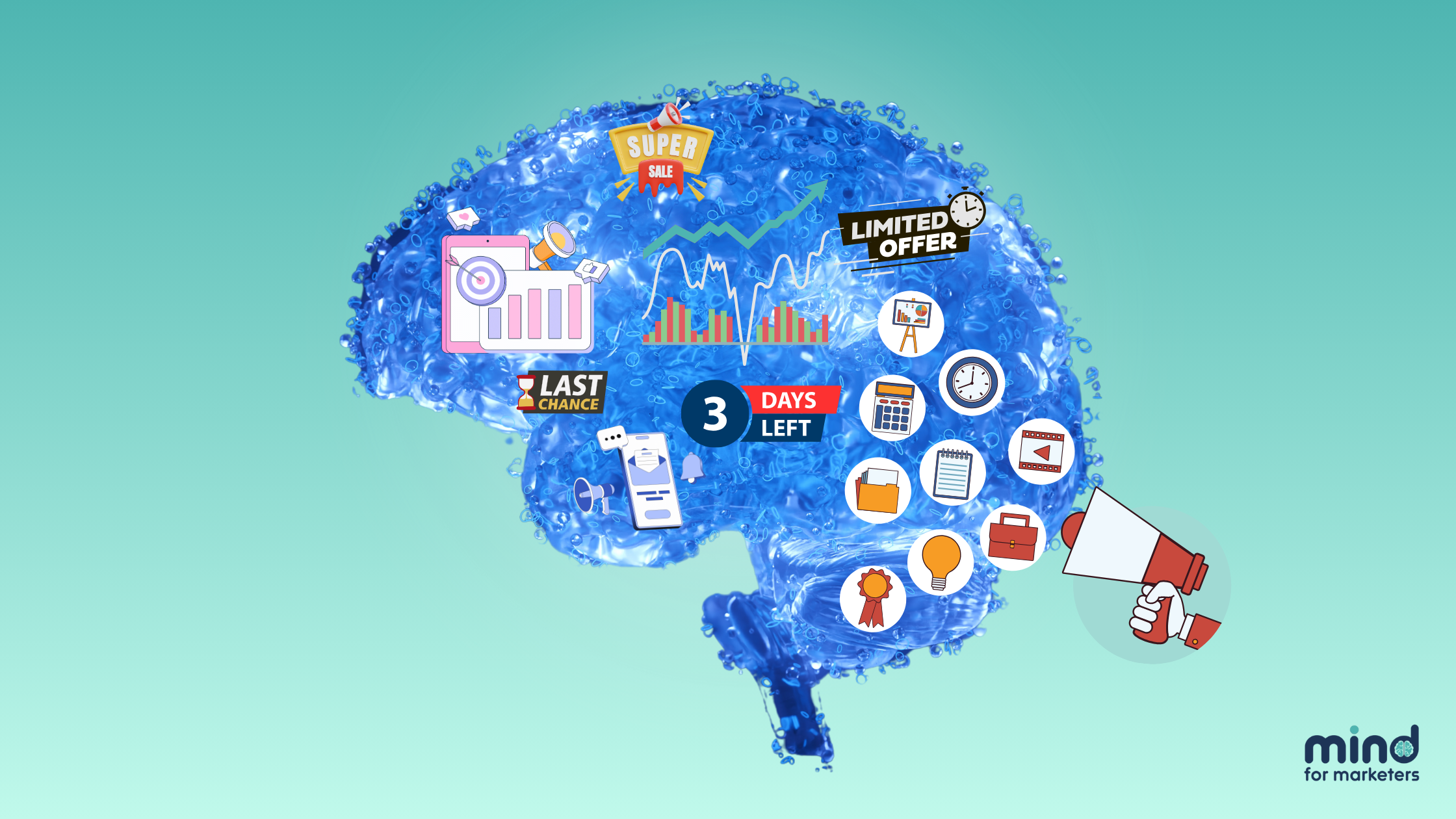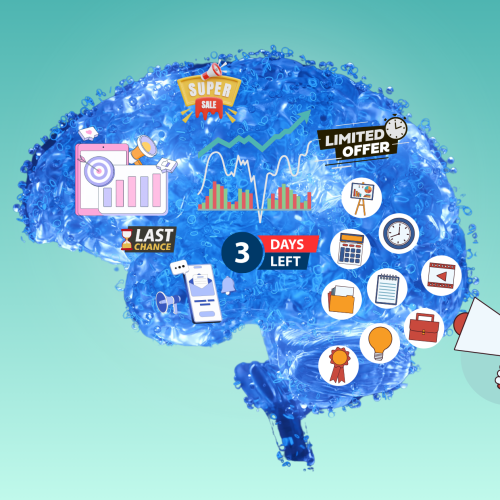In this modern era, the marketplace is tightly packed with existing and emerging brands, making branding and marketing an essential practice in setting up and sustaining the brand. Branding is not confined to designing logos and deciding brand colours, it is far more than these activities. Brand marketing plays a key role in shaping a brand’s identity in people’s minds. The main goal of branding is to acquire the faith of people and make them feel like they are already familiar with the product, and this is where psychology comes into play. In this blog, we will discuss Branding Psychology and Consumer Behaviours. What is Branding Psychology? Branding Psychology can be defined as the study of how a consumer responds to a brand’s identity, content, and other marketing strategies; and how these things influence his decisions. Multiple decisive factors affect consumer behavior toward a brand. Still, our main motive for studying or implementing branding psychology is to build an emotional connection and leave a lasting effect on the audience’s mind. It is regarding how a brand makes customers feel, how it presents its mission and its alignment with the values of the consumers. 4 Key Elements of Branding Psychology The following are the fundamental components of branding psychology: What is Consumer Behaviour? Consumer behavior refers to all the consumer actions to the selling process and the product (or service). These include how the consumer reacts to the product, its pricing, the selling attitude of the seller, and all the marketing strategies associated with that product. This also contains the consumer’s mindset and actions when disposing of the product. In short, it can be considered as the attitude of the buyer towards the product and all the things associated with the product from the first sight it reached the consumer till its disposal. Understanding Consumer Behavior should be the first step in framing a marketing strategy if the brand wants to excel from its competitors. Ideal brand marketing is always focused on gaining public attention and converting it into a consumer list, and later on retaining those customers. And for retention and sustainable growth in the rate of consumers, regular upgradation in their strategy and product is important which can be done by keeping track of consumer needs and behavior. Thus, understanding consumer behavior is a major element in building a branding strategy. The study of consumer buying psychology involves several fields of science. For example, the use of social science to analyse behaviour influenced by social factors and understand the social nature of humans while purchasing something. Use of economics, to learn about behavioural changes with change in income flow in the society and the purse at individual level. Similarly, biology and other sciences play different roles according to their subject matters to combine with psychology and market research to drive the analytics about consumer behavior in different scenarios. Why Consumer Behaviour Matters? Have you ever considered what would happen if you couldn’t find your target audience’s pain point or a trigger to convert them into customers? You’ll first need to understand your audience’s intent and mindset to boost your sales or make your content engaging in this competitive world. Some key reasons are highlighted below to state the significance of customer behavior in business, sales, or marketing : Besides building a strategy considering buyer behavior is also essential for updating the strategy from time to time. If we understand the trend of behavior among our target audience we can eliminate the strategies which no longer work and can add more efficient ones. By analyzing consumer behavior, future analysis can also be made, which allows the brand to reduce or increase production accordingly. For instance, if a brand produces some sort of seasonal goods, it is likely to increase the production in the season of sales of that good and reduce it by the end of the season. Customer satisfaction can only be predicted by analyzing consumer behavior and needs. The business can add or eliminate elements or features in the product according to customer needs to satisfy its consumers. This will probably lead to an increase in sales. Shaping the product according to customers’ requirements is essential to attract and retain customers. It is a simple observation that a person always tends to buy the product which caters to all his needs. Risk Management: By understanding customer behavior and needs, we can forecast the future demand for goods and services. This enables a business to produce and procure the products and resources that tend to have greater demand shortly. Besides, helps a business to reduce the production of goods that are no longer in demand or may have less or no demand in the future. Thus, by observing customer needs and habits, the risks of loss can be reduced to a great extent by maintaining supply according to demand. Conclusion Understanding the relationship between branding and consumer behavior is very important for leveraging the brand in today’s competitive marketplace. A marketing strategy based on the psychological principles of consumer behavior never fails. As we already discussed the banding is not confined to only logos, taglines or colors, it covers many other things too. It is about building a connection (mentally as well as emotionally) with the audience. To convert the audience into a buyer, all the power lies in building up the connection, and to build up the connection all energy comes from the psychology principles. Key takeaways: By keeping in mind the psychology of consumers, you can frame the branding strategy, campaigns, and products that resonate with your target audience and grow your sales effectively. So start by analyzing your current strategy now and make the updates that you feel are required according to the psyche of your audience. Stay tuned for more in-depth explorations of branding psychology and consumer behavior on Mind for Marketers. Your journey to marketing mastery has only just started!
Introduction to Marketing Psychology: Unlocking the Minds of Consumers
Welcome to our very first blog post on Marketing Psychology! Whether you’re a seasoned marketer, a digital marketing professional, a marketing student, or someone fascinated by human behavior, you’re in the right place. Understanding the psychological principles behind consumer decision-making can transform the way you approach marketing strategies. By understanding the way consumers think, feel, and act, marketers can create more persuasive, impactful, and customer-centric campaigns. What is Marketing Psychology? Marketing psychology is the study of how psychological principles influence consumer behavior and decision-making processes. It blends key insights from psychology with marketing strategies to better understand what drives customers to purchase, how they engage with brands, and why they make certain choices. In simple terms, marketing psychology is about understanding the “why” behind consumer actions. When you can predict the motivations, biases, and emotional triggers of your target audience, you can tailor your messaging, design, and overall marketing tactics in a way that resonates deeply with them. Why is Marketing Psychology Important? As marketers, it’s easy to fall into the trap of focusing only on demographics like age, gender, or income. While these elements are important, they don’t tell you why a consumer is drawn to your product or service. Psychology helps us look beyond surface-level data and dive deep into the cognitive processes that shape consumer decisions. This deeper understanding allows you to: Key Psychological Principles in Marketing Let’s take a closer look at some of the key psychological principles that marketers commonly leverage: 1. Reciprocity This principle is based on the idea that people feel obligated to return a favor. In marketing, this might look like offering a free trial, a sample, or a valuable piece of content. The idea is that by giving something for free, consumers are more likely to feel indebted to your brand and may reciprocate by making a purchase. 2. Scarcity Scarcity creates a sense of urgency. People tend to value things that are perceived as scarce or in limited supply. Think limited-time offers, exclusive access, or “only a few left” messages. This principle taps into the fear of missing out (FOMO), which can drive consumers to take action quickly. 3. Social Proof Reviews, testimonials, user-generated content, and case studies all act as social proof that a product or service is trustworthy and valued by others. When consumers see that others are happy with a brand, they’re more likely to trust it themselves. 4. Anchoring Anchoring refers to the tendency to rely heavily on the first piece of information we find while making decisions. In marketing, this could be using a higher “original” price next to a discounted price to make the latter appear more reasonable and attractive. The “anchor” shapes the consumer’s perception of value. 5. The Mere Exposure Effect The more a person is exposed to a stimulus, the more they tend to like it. This principle is commonly used in advertising and brand positioning. The more a consumer sees your brand, the more likely they are to trust and choose it. Repetition builds familiarity and comfort, which leads to increased brand preference over time. 6. Emotional Triggers Humans often make decisions based on emotions rather than pure logic. By tapping into feelings like happiness, fear, sadness, or excitement, you can craft more emotionally resonant campaigns. For instance, an ad that highlights the joy of using a product can create a positive association with your brand. Marketing Psychology in Action Let’s look at some real-world examples of how marketing psychology is applied: How You Can Apply Marketing Psychology Now that you understand some of the foundational psychological principles that drive consumer behavior, how can you start applying them to your marketing efforts? Conclusion Marketing psychology is a powerful tool that can give you a competitive edge in an increasingly crowded marketplace. By understanding the psychological triggers that drive consumer behavior, you can craft more effective marketing strategies. In future posts, we’ll dive deeper into specific psychological principles. Stay tuned as we explore the fascinating combination of psychology and marketing! Until next time, remember: the key to successful marketing lies in understanding the mind of the consumer.





